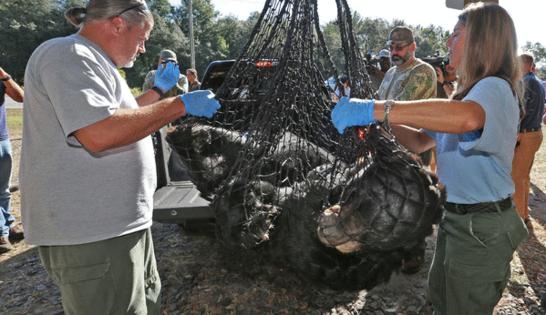Editorial: Make it clear that Floridians hate the idea of a black-bear massacre
Published in Op Eds
Despite a thundering chorus of opposition, state wildlife officials seem determined to go through with its plan to slaughter dozens, maybe hundreds, of Florida black bears this December.
Because nothing says “Merry Christmas” more than a chaotic, unsporting bloodbath featuring one of the state’s most beloved mammals.
Final approval of the hunt is expected at the Florida Fish and Wildlife Conservation Commission’s August 13-14 meeting, in the small community of Havana just north of Tallahassee. That gives anti-hunt activists a few more weeks to dial up their game, making it clear to Floridians what a bad idea this is, and urging them to get involved.
Advocates might not sway the commission, which stubbornly ignored hours of testimony from distraught Floridians and wildlife experts during the FWC’s June meeting. But they shouldn’t let members of the FWC deliver the death sentences unchallenged. Commissioners should be reminded, at every step of the process, that an overwhelming majority of Floridians are disgusted and disheartened at the prospect of another brutal, bloody bear hunt.
As envisioned by commission staff, the upcoming hunt could be worse than the last one in 2015. That hunt was supposed to be a week long, but was shut down after two days because so many bears had been killed – with a final death toll of 304. This year’s slaughter will ostensibly be limited to 187 bears spread across four zones, including one zone in Central Florida. But there’s good reason to fear that the quota will be exceeded, because hunters will have 24 hours to report their kills and meet up with commission staff for an inspection. That could allow an extra day for killing after the quota has been reached.
It will also avoid the heartbreaking sight of bear carcasses smeared with blood, piled at checkpoints.
The 2025 hunt plan includes other grisly “improvements” that will add to the horror. Hunters will be allowed to stalk bears with dogs — which could prove fatal for dogs as well as bears. According to A Humane World for Animals (formerly the Humane Society of the United States) hunters frequently put GPS trackers on their dogs and let them run. The hunter might not reach the scene of a kill for an hour or more, leaving mortally wounded animals to bleed and suffer.
The FWC also plans to allow the taking of bears near bait stations, luring hungry animals to their deaths. This is a particularly foolish move: Bears that escape the hunters’ bullets might develop a taste for human food, thus increasing the number that venture into subdivisions and other settled areas in search of more treats.
Add these fresh horrors to the historical record of the 2015 hunt and a grisly picture emerges.
Nearly 60% of the bears killed that year were female, making it all but certain that some of them left cubs to starve. Despite the assertion by the commission staff that the timing of that hunt meant cubs would be old enough to survive on their own, one in five female bears killed were found to be lactating when they died.
A final point for dissent: A thorough survey of the black bear population in Florida, but that research won’t be complete for at least a year. Without the best available data, there’s no guarantee that this year’s slaughter actually helps the species or keeps humans safer. That’s because the weight of the evidence available now suggests the opposite.
Certainly, there’s reason to be concerned about human-bear encounters. Earlier this year, the state’s first suspected fatality from a bear attack was reported. But there are far better ways to manage that danger. That includes teaching homeowners to secure garbage cans and other sources of food, and to manage bear encounters in a way that lets both human and bear escape safely. When Seminole County — a former hotspot for bear encounters — adopted these measures and launched a public information campaign, incidents of human interaction dropped dramatically.
The goal of preserving and strengthening the bear population is fundamentally at odds with a pre-holiday slaughter. Floridians understand this, which is probably why more than three-quarters of respondents to two polls said they were opposed to more hunts.
And while many believe the authorization of the planned bear massacre is unavoidable, Floridians should still raise their voices and urge the commission to reconsider. This is an ignoble plan that cites dubious science while elevating the entertainment of a handful of hunters over the revulsion of most Floridians. Residents should speak up and make it clear: This hunt would be a brutal mistake.
_____
©2025 Orlando Sentinel. Visit orlandosentinel.com. Distributed by Tribune Content Agency, LLC.

























































Comments